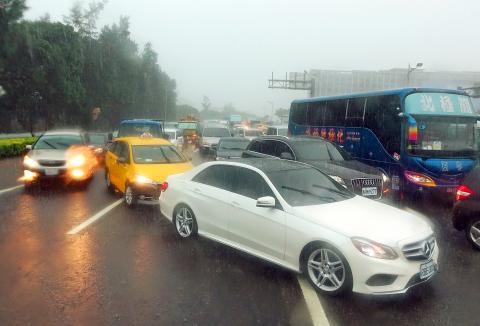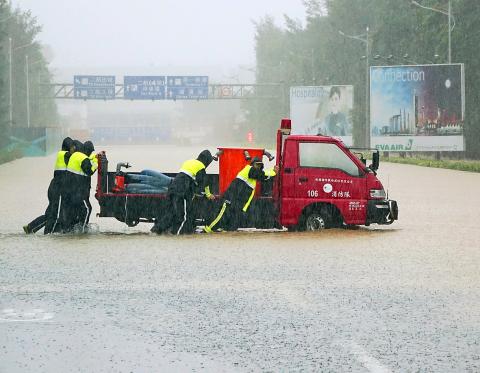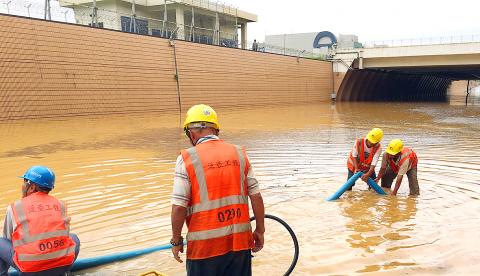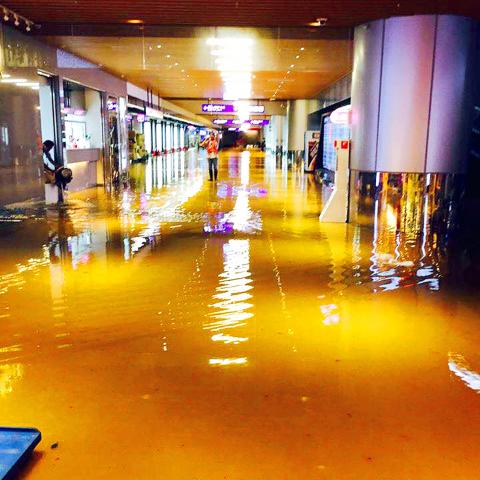Extremely heavy rainfall brought by a frontal system pummeled northern Taiwan yesterday morning, severely disrupting operations at Taiwan Taoyuan International Airport and affecting more than 200 flights.
The Ministry of Transportation and Communications said that the thunderstorms, which lasted for more than two hours, as well as overflow from the Pusin River (埔心溪), had caused flooding at the two traffic underpasses leading to the airport terminals.
Because of the flooding in the underpasses, motorists traveling to and from the airport were asked to use Provincial Highway No. 4, rather than the usual route, Freeway No. 2.

Photo: Chu Pei-hsiung, Taipei Times
Rainwater also leaked through the ceiling of Terminal Two and caused flooding in its underground food court.
Air navigation facilities on Datunshan (大屯山), in Taipei’s Beitou District (北投), which are used to guide air traffic into the airport, were also affected by the thunderstorms, forcing Air Navigation and Weather Services to activate a backup system in order to continue with air traffic control procedures.
By 1:30pm, 88 flights arriving at the airport and 131 departure flights had been affected by the weather, including two flights that were forced to land at airports in Kaohsiung and Taichung.

Photo: Chu Pei-hsiung, Taipei Times
After pumping out the floodwater, the airport reopened its main access routes at 6:13pm.
Passengers were crowded in the lobby of Terminal Two last night due to a backlog of delayed flights and an incomplete resumption of the power supply inside the terminal.
In response to the worst flooding since the airport opened in 1979, Premier Lin Chuan (林全) ordered the ministry to identify the causes of the flooding, adding that it must also identify those who should be held accountable.

Photo: CNA
“Lin was upset, because the airport is the gateway of the nation, and the flood caused a lot of trouble to the public,” Executive Yuan spokesman Tung Chen-yuan (童振源) said. “The premier said that apparently there are serious problems with the construction [of the third terminal] at the airport, and asked the ministry to investigate — if there are human factors involved, then those people should be held responsible as well,” Tung said.
Deputy Minister of Transportation and Communications Wang Kwo-tsai (王國材) said that the ministry would deal with the issue of overflow from the Pusin River with assistance from the Water Resources Agency and the Taoyuan City Government.
He said that Taoyuan International Airport Corp (TIAC) needs to reinforce its ability to handle flooding at the airport, including the use of water pumps and power generators.

Photo: CNA, screengrab from Facebook
“TIAC must learn to coordinate with the Taoyuan City Government and its police department to facilitate access to the airport when flooding occurs,” Wang said.
The Taoyuan City Government dismissed claims from TIAC that the overflow from the Pusin River had clogged the airport’s drainage system with trash and tree branches.
However, Wang said that now is not the time to be looking for someone to blame.
“The most important thing is to solve the problem,” he said.
Wang said that 153mm of rain had poured into Taoyuan within three hours yesterday morning.
The Central Weather Bureau said that rainfall in Taoyuan yesterday morning accounted for about 8 percent of the city’s average annual rainfall, which is about 1,930mm.
The bureau said that the heavy rain was caused by a convection system, which moved slowly and caused heavy rainfall between 9:30am and 11:30am.
Additional Reporting by Loa Ioksin

The Taiwanese passport ranked 33rd in a global listing of passports by convenience this month, rising three places from last month’s ranking, but matching its position in January last year. The Henley Passport Index, an international ranking of passports by the number of designations its holder can travel to without a visa, showed that the Taiwan passport enables holders to travel to 139 countries and territories without a visa. Singapore’s passport was ranked the most powerful with visa-free access to 192 destinations out of 227, according to the index published on Tuesday by UK-based migration investment consultancy firm Henley and Partners. Japan’s and

NATIONAL SECURITY THREAT: An official said that Guan Guan’s comments had gone beyond the threshold of free speech, as she advocated for the destruction of the ROC China-born media influencer Guan Guan’s (關關) residency permit has been revoked for repeatedly posting pro-China content that threatens national security, the National Immigration Agency said yesterday. Guan Guan has said many controversial things in her videos posted to Douyin (抖音), including “the red flag will soon be painted all over Taiwan” and “Taiwan is an inseparable part of China,” while expressing hope for expedited “reunification.” The agency received multiple reports alleging that Guan Guan had advocated for armed reunification last year. After investigating, the agency last month issued a notice requiring her to appear and account for her actions. Guan Guan appeared as required,

Japan and the Philippines yesterday signed a defense pact that would allow the tax-free provision of ammunition, fuel, food and other necessities when their forces stage joint training to boost deterrence against China’s growing aggression in the region and to bolster their preparation for natural disasters. Japan has faced increasing political, trade and security tensions with China, which was angered by Japanese Prime Minister Sanae Takaichi’s remark that a Chinese attack on Taiwan would be a survival-threatening situation for Japan, triggering a military response. Japan and the Philippines have also had separate territorial conflicts with Beijing in the East and South China

A strong cold air mass is expected to arrive tonight, bringing a change in weather and a drop in temperature, the Central Weather Administration (CWA) said. The coldest time would be early on Thursday morning, with temperatures in some areas dipping as low as 8°C, it said. Daytime highs yesterday were 22°C to 24°C in northern and eastern Taiwan, and about 25°C to 28°C in the central and southern regions, it said. However, nighttime lows would dip to about 15°C to 16°C in central and northern Taiwan as well as the northeast, and 17°C to 19°C elsewhere, it said. Tropical Storm Nokaen, currently